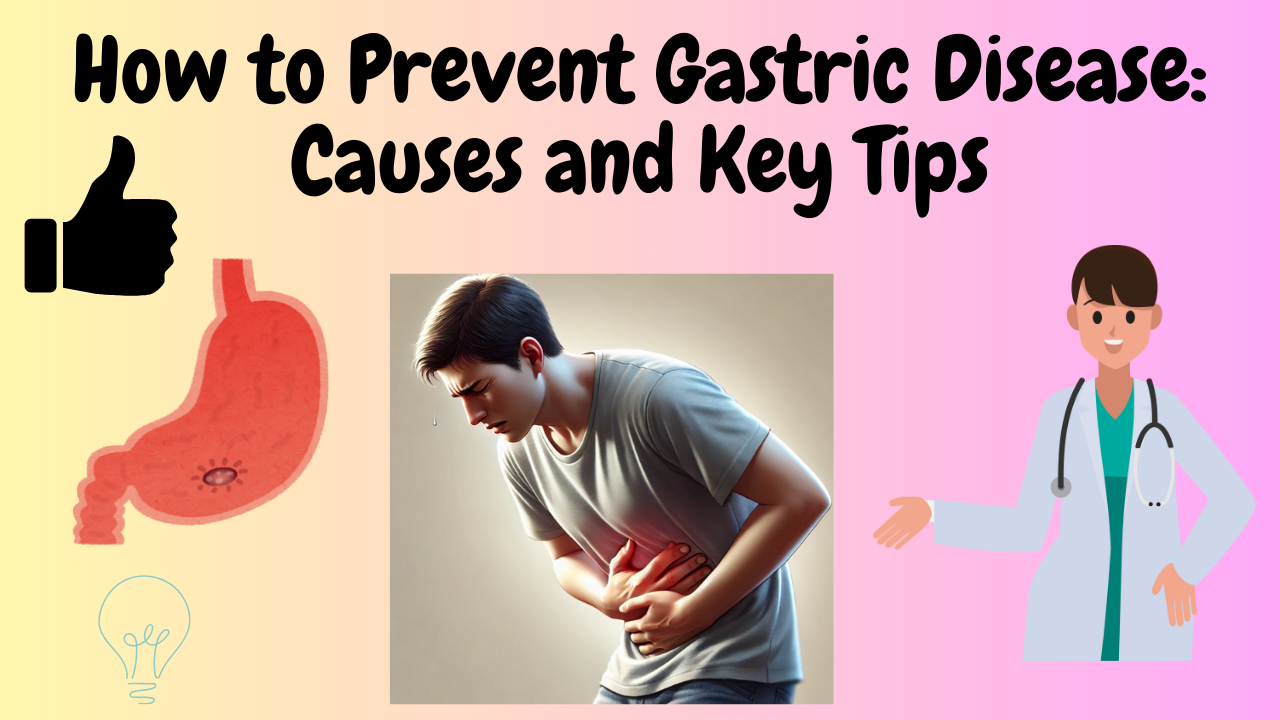Gastric diseases, often simply referred to as “stomach problems” or “gastric issues,” encompass a range of digestive ailments affecting the stomach and gastrointestinal tract. These diseases can vary from mild indigestion to severe conditions like peptic ulcers or gastritis. As they are common worldwide, understanding how gastric diseases develop and, more importantly, how to prevent them is crucial for maintaining digestive health. Let’s delve into the causes, symptoms, and learn how to prevent gastric disease and find out preventive measures to keep your stomach healthy and functional.
What Causes Gastric Diseases?
Gastric diseases can arise from a variety of factors, ranging from dietary choices to lifestyle habits and infections. Here are the most common causes:
- Infection with Helicobacter pylori (H. pylori)
The bacterium H. pylori is a significant cause of many gastric diseases, including gastritis and peptic ulcers. It is thought to spread through contaminated food, water, or contact with saliva. Once it enters the stomach, it can damage the stomach lining, leading to inflammation and ulcers. - Diet and Eating Habits
Poor dietary choices, such as consuming highly processed foods, spicy or acidic foods, and foods high in fat, can irritate the stomach lining. Overeating, eating too quickly, or irregular eating patterns can also disrupt digestive function and increase the risk of gastric problems. - Excessive Alcohol Consumption
Alcohol irritates the stomach lining, making it more vulnerable to inflammation and erosion. Chronic alcohol use is one of the leading contributors to conditions like gastritis and ulcers. - Use of Non-Steroidal Anti-Inflammatory Drugs (NSAIDs)
Medications like ibuprofen, aspirin, and naproxen, when used regularly, can damage the protective lining of the stomach. This can lead to stomach irritation, gastritis, and in severe cases, ulcers. - Smoking
Smoking has been shown to increase stomach acid production and can weaken the stomach’s protective lining. This combination raises the risk of inflammation and ulceration in the stomach. - Stress
While stress alone doesn’t directly cause gastric disease, it can exacerbate symptoms of existing gastric conditions. Stress can also lead to lifestyle changes, such as poor dietary choices, which may contribute to digestive issues. - Autoimmune Disorders and Other Medical Conditions
Some people may develop gastritis or other gastric issues due to autoimmune conditions, where the immune system mistakenly attacks the stomach lining. Chronic diseases, like diabetes and Crohn’s disease, can also increase the likelihood of developing gastric disorders.
Common Symptoms of Gastric Diseases
While symptoms may vary depending on the specific gastric condition, some common signs include:
- Stomach pain or discomfort (especially after meals)
- Bloating
- Nausea or vomiting
- Indigestion or acid reflux
- Loss of appetite
- Unexplained weight loss
- Dark or bloody stools (a sign of ulcers or bleeding in the digestive tract)
If these symptoms persist, especially in combination, it’s essential to seek medical advice to rule out serious conditions and receive appropriate treatment.
Prevent Gastric Disease: Tips for a Healthy Stomach
While some factors, like genetics, cannot be controlled, many lifestyle and dietary adjustments can reduce the risk of developing gastric diseases. Here are some effective prevention strategies (prevent gastric disease):
- Adopt a Balanced Diet
A diet rich in fiber, lean proteins, fruits, and vegetables can promote healthy digestion. Avoid overly processed foods, excessive sugar, and foods that are high in fat, as they can irritate the stomach lining and disrupt digestive health. - Practice Regular Eating Patterns
Eating at regular intervals and not skipping meals can help the stomach produce acid at appropriate times, reducing the risk of irritation. Avoid eating too late at night, as lying down after meals can contribute to acid reflux. - Limit Alcohol Intake
Reducing alcohol consumption can protect the stomach lining from damage. For individuals who consume alcohol, it’s advisable to follow moderate drinking guidelines and avoid drinking on an empty stomach. - Avoid Overuse of NSAIDs
When possible, limit the use of NSAIDs and explore alternative pain relief options. If you need to use these medications frequently, speak with a healthcare provider about safer alternatives or protective medications. - Quit Smoking
Quitting smoking can significantly reduce the risk of gastric diseases. There are many resources available to help people quit smoking, including support groups and medications. - Manage Stress Levels
Since stress can exacerbate gastric symptoms, incorporating stress-reducing practices like meditation, exercise, or hobbies can help maintain a healthier digestive system. Getting adequate sleep and balancing work and relaxation can also reduce stress levels. - Consider Probiotics
Probiotics can aid in maintaining a healthy balance of gut bacteria. Yogurt, kefir, and fermented foods contain natural probiotics, or supplements are available. Probiotics can be particularly helpful after a course of antibiotics, which can disrupt gut bacteria. - Stay Hydrated
Drinking adequate water is essential for digestion. Water helps break down food and absorb nutrients while also flushing out toxins that could irritate the stomach lining. - Avoid Spicy and Acidic Foods if Sensitive
For individuals prone to gastric discomfort, limiting spicy, acidic, and greasy foods can help reduce irritation. Foods like coffee, citrus fruits, and tomatoes may trigger symptoms in some people. - Routine Medical Checkups
Regular checkups and screenings for infections like H. pylori can catch potential issues early. For those with a history of gastric issues, periodic checkups can help monitor for any signs of worsening conditions.
Conclusion (Prevent Gastric Disease)
While gastric diseases can be painful and disruptive, understanding their causes and taking preventive measures can help you avoid them. By maintaining a balanced diet, managing stress, and being mindful of lifestyle habits, you can significantly reduce your risk of developing gastric issues. Regular medical checkups and listening to your body’s signals are also key to long-term digestive health. (prevent gastric disease)
Similar Blogs :



